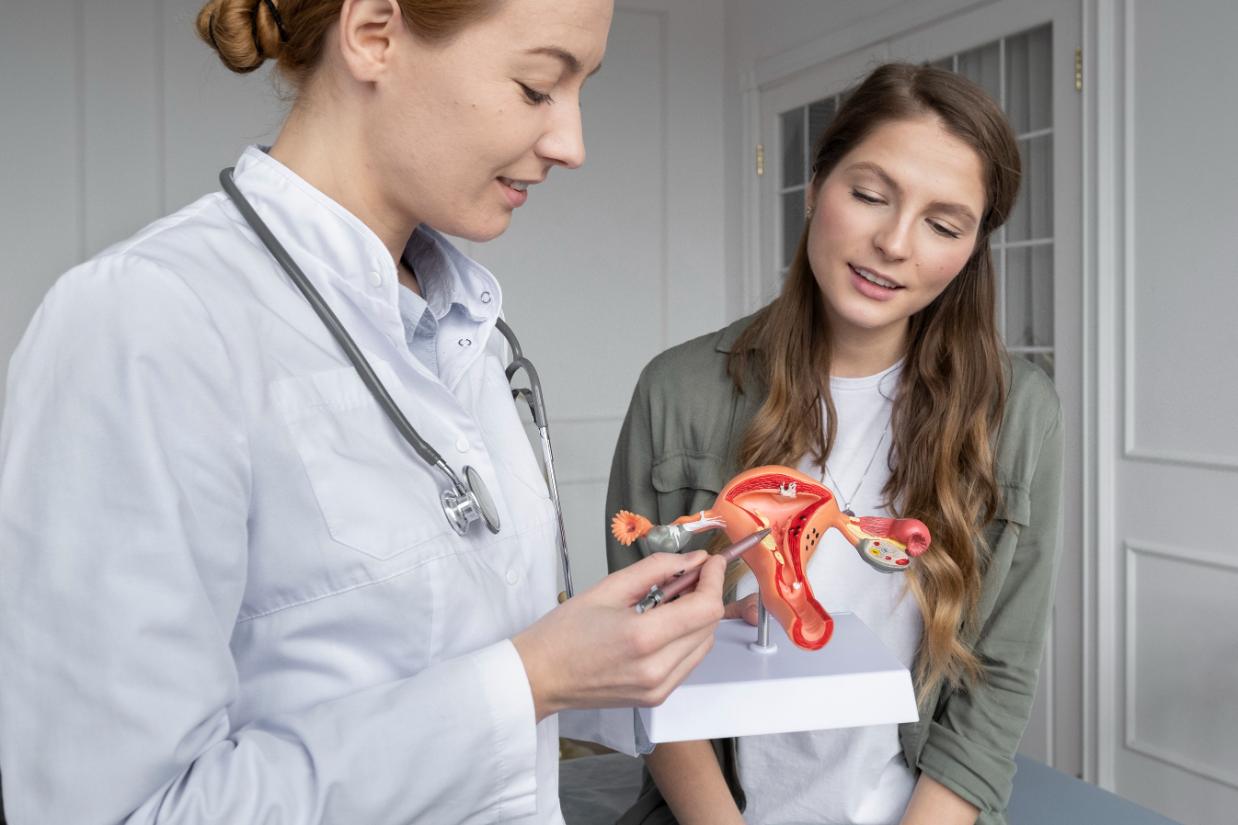Maintaining a healthy uterus is fundamental to a woman’s reproductive health, fertility, and overall well-being. The uterus plays a pivotal role in menstruation, pregnancy, and hormonal balance. Ensuring its health is essential not only for conception but also for preventing various gynecological issues. This article delves into effective strategies used by the fertility experts at KJK Hospital to promote uterine health, combining natural approaches with medical expertise.
Understanding Uterine Health
A healthy uterus is characterized by regular menstrual cycles, absence of chronic pain, and a favorable environment for embryo implantation. Factors influencing uterine health include hormonal balance, lifestyle choices, and underlying medical conditions. Addressing these factors proactively can prevent complications such as fibroids, endometriosis, and infertility.
Understanding the Uterus Better
The uterus is a hollow, muscular organ located in a woman’s lower abdomen between the bladder and the rectum. It plays a vital role in the female reproductive system. Often referred to as the “womb,” the uterus is where a fertilized egg implants and grows into a baby during pregnancy. Shaped like an upside-down pear, it consists of three main parts: the fundus (top), the body (central part), and the cervix (lower end that opens into the vagina). The uterus is lined with a special tissue called the endometrium, which thickens every month in preparation for a potential pregnancy and sheds during menstruation if pregnancy doesn’t occur.
Beyond its role in reproduction, the uterus is essential for hormonal balance. It works closely with the ovaries and other endocrine glands to regulate the menstrual cycle and support the body’s overall health. The uterus contracts during menstruation to help expel the endometrial lining, and during childbirth, its strong muscles push the baby through the birth canal. Any disruption in the uterine health, such as fibroids, infections, or endometriosis, can affect menstruation, fertility, and even overall well-being.
Understanding the structure and function of the uterus helps women make informed decisions about their reproductive and hormonal health. Whether you’re trying to conceive, managing a health condition, or simply aiming to maintain a healthy lifestyle, taking care of your uterus is essential. This is why regular check-ups, a balanced diet, and stress management are all critical to keeping your uterus in optimal condition throughout every stage of life.
Tips to Follow for a Healthy Uterus
1. Adopt a Balanced Diet Rich in Nutrients
Nutrition plays a crucial role in maintaining uterine health. A diet abundant in fruits, vegetables, whole grains, and lean proteins provides essential vitamins and minerals that support hormonal balance and uterine function.
- Folic Acid and Iron: These nutrients are vital for reproductive health and preventing anemia, which can affect menstrual cycles.
- Omega-3 Fatty Acids: Found in fish and flaxseeds, they help reduce inflammation and may prevent conditions like endometriosis.
- Antioxidants: Vitamins C and E protect uterine tissues from oxidative stress.
Limiting intake of processed foods, excessive sugar, and saturated fats is equally important, as these can contribute to hormonal imbalances and inflammation.
2. Engage in Regular Physical Activity
Regular exercise enhances blood circulation, supports hormonal balance, and helps maintain a healthy weight—all of which are beneficial for uterine health.
- Aerobic Exercises: Activities like walking, swimming, and cycling improve cardiovascular health and circulation to pelvic organs.
- Strength Training: Building muscle mass supports overall metabolism and hormonal function.
- Yoga and Stretching: These practices can alleviate pelvic tension and improve flexibility.
Aim for at least 150 minutes of moderate-intensity exercise per week, as recommended by health authorities.
3. Manage Stress Effectively
Chronic stress can disrupt hormonal balance, leading to menstrual irregularities and other reproductive issues. Implementing stress-reduction techniques is essential.
- Mindfulness and Meditation: Regular practice can lower cortisol levels and promote hormonal equilibrium.
- Deep Breathing Exercises: These can help calm the nervous system and reduce stress-induced hormonal fluctuations.
- Adequate Sleep: Ensuring 7-9 hours of quality sleep per night supports overall hormonal health.
Engaging in hobbies, social activities, and seeking professional support when needed also contributes to stress management.
4. Avoid Exposure to Environmental Toxins
Certain environmental toxins, known as endocrine disruptors, can interfere with hormonal function and negatively impact uterine health.
- Limit Use of Plastics: Avoid heating food in plastic containers and opt for glass or stainless steel alternatives.
- Choose Natural Personal Care Products: Select products free from parabens, phthalates, and synthetic fragrances.
- Be Cautious with Pesticides: Wash fruits and vegetables thoroughly to reduce pesticide exposure.
Being mindful of environmental exposures helps maintain hormonal balance and supports uterine health.
5. Maintain a Healthy Weight
Body weight significantly influences hormonal balance and reproductive health. Both underweight and overweight conditions can lead to menstrual irregularities and fertility issues.
- Body Mass Index (BMI): Aim for a BMI within the normal range (18.5–24.9) to support optimal reproductive function.
- Balanced Diet and Exercise: Combine nutritious eating with regular physical activity to achieve and maintain a healthy weight.
Consulting with healthcare providers for personalized guidance can be beneficial in managing weight effectively.
6. Schedule Regular Gynecological Check-Ups
Routine medical evaluations are vital for the early detection and management of potential uterine issues.
- Pelvic Examinations: Regular exams help identify abnormalities such as fibroids or cysts.
- Pap Smears: Screening for cervical health is essential in preventing complications that can affect the uterus.
- Ultrasound Imaging: This can assess the uterine lining and detect structural concerns.
Early intervention through regular check-ups ensures timely management of any emerging issues.
7. Seek Professional Guidance When Needed
Consulting with healthcare professionals is crucial when experiencing symptoms such as irregular periods, pelvic pain, or fertility challenges.
- Medical Evaluation: A thorough assessment can identify underlying causes and guide appropriate treatment.
- Personalized Treatment Plans: Healthcare providers can recommend interventions tailored to individual needs, including medication, lifestyle modifications, or surgical options if necessary.
Timely professional support is key to addressing concerns and maintaining uterine health.
Conclusion
Ensuring a healthy uterus is a multifaceted endeavor involving nutrition, physical activity, stress management, environmental awareness, weight maintenance, regular medical check-ups, and professional guidance. By adopting these strategies, women can support their reproductive health and overall well-being.Remember, proactive care and informed choices are empowering steps toward a healthy uterus and a fulfilling life. Consult for deeper guidance from the experts.





